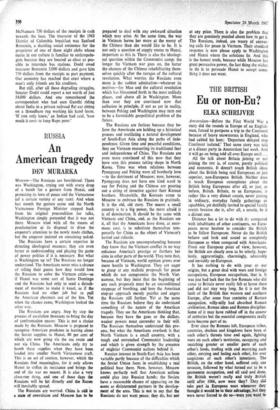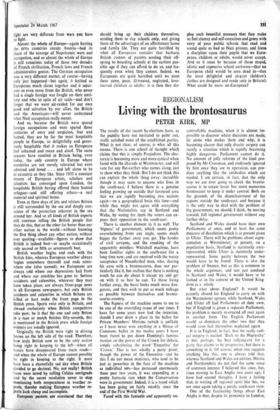Eu or non-Eu?
THE BRITISH
ELKA SCHRIJVER Amsterdanz—Before the First World War a story did the rounds in Europe of an English- man, forced to postpone a trip to the Continent because of heavy snowstorms in England, who had cabled his host: 'Departure delayed stop Continent isolated.' That same story was told at a dinner party in Amsterdam last week. And it will go on being told all over Europe until ...
All the talk about Britain joining or not joining the EEC is, of course, purely political and economic. It doesn't touch British ideas about the British being real Europeans or just superior, non-European British. Neither does it touch European conceptions about the British being Europeans after all, or just, as before, British. Britain, to us Europeans, is rather like a very distant cousin, never joining in ordinary, everyday family gatherings or squabbles, yet dutifully invited to special family events because she is, after all, a cousin, be it a distant one.
Distance has a lot to do with it: compared with inhabitants of other continents, we Euro- peans never hesitate to consider the British to be fellow Europeans. Never do the British behave and look and sound so completely European as when compared with Americans. From our European point of view, however, the British are clearly seen to be utterly, hope- lessly, aggravatingly, charmingly, admirably and enviably un-European.
It has nothing to do with your or our origins, but a great deal with wars and foreign occupations, European occupations, that is. It was just bad luck that the few Romans who did come to Britain never really felt at home there and did not stay very long. So it is not the fault of the British that western and southern Europe, after some four centuries of Roman occupation, willy-nilly had absorbed Roman civilisation, Roman ideas and Roman discipline. Some of it may have rubbed off in the course of centuries but the essential components really have become part of us.
Ever since the Romans left, European tribes, countries, duchies and kingdoms have been at each other's throats time and again, fighting wars on each other's territories, occupying and snatching greater or smaller parts of each other's lands, trading with and marrying each other, envying and hating each other, for ever suspicious of each other's intentions. The British, on the other hand, suffered only one invasion, followed by what turned out to be a permanent occupation, and all said and done, the British weren't really and truly British until after 1066, now were they? They did take part in European wars whenever they thought it would be to their advantage, but they were never forced to do so—wars you want to
fight are very different from wars you have to fight.
Almost the whole of Europe—again barring the EFTA countries except Austria—had its share of the scourge of Napoleonic wars and occupation, and so almost the whole of Europe is still conscious today of those two decades of French civilisation, French laws and French administrative genius. The German occupation was a very different matter, of course—having only just happened—but again, it knitted us Europeans much closer together and it separ- ates us even more from the British, who never had a single foreign war fought on their terri- tory and who in spite of air raids—and don't forget that we were air-raided for our own good and salvation by our allies, the British and the Americans—will never understand what Nazi occupation really meant.
And so, because the British were spared foreign occupations and were spared those centuries of envy and suspicion, fear and hatred, they are by far the most hospitable people in Europe, so delightfully and gener- ously hospitable that it makes us Europeans feel ashamed and mean and aloof. The same reasons have resulted in Britain being, even today, the only country in Europe where eccentrics are not merely tolerated but even admired and loved . . . and left alone to be as eccentric as they like. Since 1933 a constant stream of European artists, scholars and scientists has converged upon London, the hospitable British having offered these hunted refugees—and still offering others—a real material and spiritual home.
Even in these days of jets and telstars Britain is still surrounded by the sea and deeply con- scious of the protection inherent in the sea around her. And so all kinds of British experts still continue telling the British people that they do this, that or the other far better than any other nation in the world—without knowing the first thing about any other nation, without ever quoting—available--figures to show that British is indeed best—or maybe occasionally only second or fifth or seventeenth best.
British weather begins and ends with the British Isles, whereas European weather always begins somewhere (named) and ends some- where else (also named); we Europeans are always told where our depressions hail from and where our sunshine has gone to. Serious accidents and calamities, wherever they may have taken place, are always front-page news in all European newspapers, but only British accidents and calamities in which Britons are killed or hurt make the front page in the British press. Sports exist only in Britain, and abroad exclusively when British competitors take part; be it that the one and only Briton in a race or match finishes fifty-seventh, this is mentioned in the British press while foreign winners are usually ignored.
Originally the British were right in driving horses on the left side of the road. Therefore, how truly British now to be the only nation being right in keeping to the left—when all horses have disappeared from main roads— and when the whole of Europe cannot possibly he right in keeping to the right. It must have been a shamefully sad day when Britain decided to go decimaL No, not really! British faces were saved by calling Celsius centigrade and by the secret resolution never to stop mentioning both temperatures in weather re- ports, thereby making European weather re- ports look cheap and incomplete.
European parents are convinced that they
should bring up their children themselves, sending them to day schools only, and giving them all the advantages of an affectionate home and family life. They are quite horrified by what all Europeans consider that barbaric British custom of parents sending their off- spring to boarding schools at the earliest pos- sible age if they can afford to do so, and fre- quently even when they cannot. Indeed, we Europeans are quite horrified until we meet these same, poor, ill-treated, neglected, love- starved children as adults: it is then they dis-
play such beautiful manners that they make us feel clumsy and self-conscious and green with envy of your public schools that read and sound quite as bad as Nazi prisons, and force a discipline upon their pupils that we Euro- peans, children or adults, would never accept. And so it must be because of those stupid, idiotic and expensive school uniforms—that no European child would be seen dead in—that the most delightful and elegant children's clothes are designed and made only in Britain!, What could be more un-European?



































 Previous page
Previous page